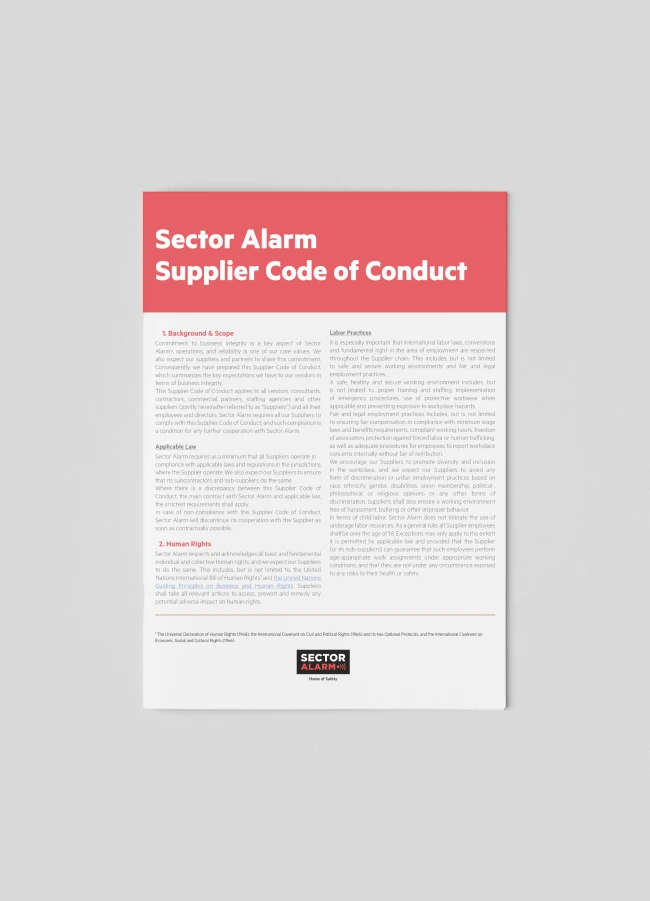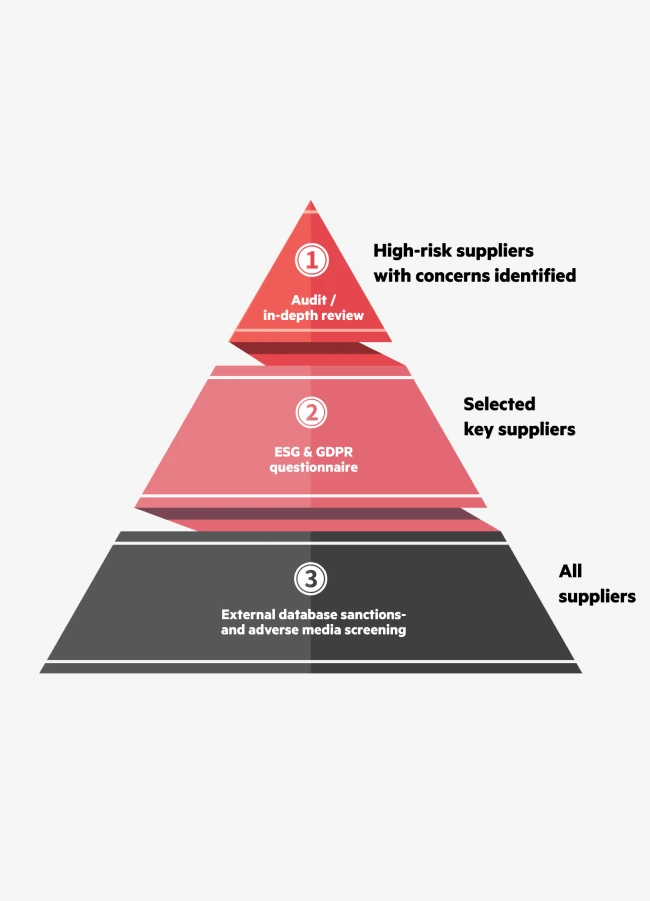Norwegian Transparency Act
Sector Alarm is one of Europe’s leading safety providers with more than 650,000 satisfied and safe customers. We have been in operation for over 25 years and deliver superior alarm solutions to homeowners and businesses across Europe. Providing excellent customer service is extremely important to us and we are proud of our consistent high customer satisfaction rating.
Sector Alarm has experienced strong growth over the years and is continuing to expand in both new and existing markets. Today, we are over 3,000 employees operating in Norway, Sweden, Finland, Ireland, Spain, France, Italy and Portugal. Our focus on hiring the right people has enabled us to offer customers state-of-the-art security solutions and gain strong market positions in the countries where we operate.


The purpose of the Transparency Act is to enhance companies’ focus on – and compliance with – fundamental human rights and fair labor conditions, and to increase the access to information for consumers, journalists and others in terms of what the companies are doing in this area to ensure compliance. There are similar initiatives in other countries where Sector Alarm has business operations, including France, as well as in the EU. The Transparency Act introduces the following new obligations for Sector Alarm:
- An obligation to perform due diligence and risk assessments in terms of the risk that the company or its suppliers and partners violate fundamental human rights or fair labor conditions
- An obligation to report on the results of the risk assessment annually
- An obligation to respond to requests from third parties within three weeks
Below is an outline of the steps taken and the assessments made by Sector Alarm in connection with the Transparency Act. For information about Sector Alarm’s operations, structure and organization, reference is made to the annual report.
This report pertains to Sector Alarm Topco AS, including its subsidiaries that are subject to the reporting obligation under the Transparency Act. This applies to Sector Alarm Holding AS, Sector Alarm AS, Sector Alarm Tech AS, SA Salg AS, Sector Alarm Drift AS and Sector Alarm Midco AS. The report is also available in Norwegian at www.sectoralarm.no/apenhetsloven.
Sector Alarm has a group-wide Code of Conduct applicable to all employees, hired-ins, contingent workers and consultants. The Code of Conduct can be found here.
Furthermore, Sector Alarm has a Charter for the Board of Directors setting out the roles and responsibilities of – and instructions to – the Board of Directors and executive management. The Charter follows the principles of the Norwegian Code of Practice for Corporate Governance (NUES) and the Norwegian Limited Liability Companies’ Act. In addition to other key corporate governance principles, the Charter underlines that the Board of Directors and the executive management are ultimately accountable and responsible for Sector Alarm’s ESG efforts as well as compliance with fundamental human rights and fair labor conditions throughout the Sector Alarm group of undertakings.


In Sector Alarm, we have a code of conduct that is based on the guidelines from NHO, Transparency International and UN Charter for Human Rights and consists of the following sections:
- General compliance with applicable law
- Anti-corruption, fraud and bribery
- Respect for human rights and fair labor practices
- Sanctions
- ESG
As part of Sector Alarm’s work with both ESG in general and with the Transparency Act in particular, the company has taken several steps to improve our procurement processes. The executive management has, among other things, approved a new vendor management and outsourcing policy, setting out the processes, roles and responsibilities for managing supplier contracts in Sector Alarm. This policy has also been condensed into an interactive guideline for how to become a better buyer, which has been distributed to all leading managerial personnel in Sector Alarm. In addition, during the spring of 2024, digital training was carried out for employees who handle purchases in Sector Alarm.
In August 2023, a training session was held for all leading managerial personnel throughout Sector Alarm in relation to the Transparency Act, focusing on what Sector Alarm must do in order to ensure compliance with the act. The training session was recorded and later distributed to those that were not able to attend. Furthermore, training sessions have been held in various settings across the group, such as Finance Director forum, Managing Director forum, board meetings and other appropriate junctions. The focus on training and awareness, especially in terms of supplier management, will be maintained also in 2024 by the Group Procurement Director.


All new vendors, partners and suppliers shall pursuant to Sector Alarm’s policy be screened in a risk and compliance database prior to any contract being signed or money being paid. The screening both reveals if the third party is on any international sanctions lists and if the third party has any relations with politically exposed persons or governmental agencies. Furthermore, the screening also includes adverse media articles from across the global, for example in terms of regulatory scrutiny, anti-trust violations, human rights infringements or lawsuits pertaining to unfair labor conditions.
Read moreAs set out in our ESG report on previous occasions, Sector Alarm distributes an ESG & GDPR questionnaire to selected key suppliers and partners based on pre-determined selection criteria. As of 2022, a new criteria was added as a follow-up of the introduction of the Transparency Act: The risk that the supplier or partner violates fundamental human rights or fair labor conditions requirements. The selection was partly based on the results from the screening of third parties (described above) where adverse media findings indicated that there had been allegations of such violations historically. Furthermore, we also included industries where there typically are risks of such violations, for example the clothing industry where there has been allegations of child labor towards some industry players.
Furthermore, the ESG & GDPR questionnaire includes even more questions than previously regarding human rights and fair labor conditions, in addition to anti-corruption and bribery questions.
Upon receipt of the filled-out questionnaire, the answers are reviewed by the contract owner in question. If there are any answers requiring follow-up or further investigations, this is the responsibility of the contract owner.
It should be noted that there are suppliers who do not respond to the ESG & GDPR questionnaire, mainly the large international technology companies who do not have the capacity to answer questionnaires from individual customers. In those cases, we are often referred to the reports available on their websites or alternatively third-party independent audit reports they make available to their customers upon requests.

In 2022, selected managerial personnel in Sector Alarm participated in a workshop to perform a risk assessment connected to the new Transparency Act. The risk assessment was split in two, whereas the first aspect was to consider the risk that Sector Alarm is violating any fundamental human rights or regulations on fair labor conditions. The second aspect was the risk that any of Sector Alarm’s suppliers or partners are violating human rights or regulations on fair labor conditions.
When it comes to Sector Alarm’s own compliance with human rights and the applicable ILO conventions regarding fair labor conditions, the main risks identified were in terms of the working environment for our employees, consultants, contingent workers and hired-ins, for example in terms of working hours (not allowing excessive overtime), avoiding bullying or harassment in the workplace, and health- and safety regulations given that our security advisors may potentially be subject to accidents while installing alarm equipment for our customers. However, given the mitigating actions already in place in the company, such as our Code of Conduct, policies, whistleblowing channel and clear workplace safety instructions, none of the risks identified were deemed to represent a high residual risk that the company violates any human rights or fair labor conditions. That being said, Sector Alarm is continuously working on improving these aspects in order to protect our customers and staff from any such violations, and this work will continue also in 2024.
On the supplier and partner side, Sector Alarm has not identified any material or high risks that Sector Alarm either contributes to or has a direct link violations of human rights indirectly through its partners and suppliers. In terms of spend categories, one of Sector Alarm’s largest spend category for suppliers is in relation to IT services, including software, IT equipment and hardware, licenses, engineering and IT advisory services. Our risk assessment shows that there no residual high risks pertaining to this spend category.

Setting aside the IT services, the key labor and resource intensive categories in Sector Alarm’s supply chain are as follows:
- Manufacturing of staff uniforms and clothing
- Manufacturing of alarm components and hardware
- Partnership with guarding companies for the provision of call-out services
- Digital marketing services
In terms of manufacturing of staff uniforms, clothing and alarm components, we have clear contractual requirements towards our suppliers in terms of respect for human rights, especially in terms of safe working conditions, waste management and carbon emissions, prohibition against unlawful child labor, and fair labor practices (equal pay, written contracts, overtime payments etc.). Based on our close cooperation with these suppliers as well as continuous dialogue and clear requirements, we have not identified any residual high risks in relation to such suppliers.
For the call-out services, the risk of non-compliance with applicable laws and regulations, hereunder human rights and fair labor conditions, is deemed very limited as this is a highly regulated industry with strict regulatory requirements and supervisory scrutiny.
Digital marketing activities is a key part of Sector Alarm’s business strategy in order to ensure both marketing of our services but also our open positions. Sector Alarm has digital marketing campaigns on Facebook, Snapchat, Google, Instagram and TikTok as well as several other digital platforms. From a human rights perspective, Sector Alarm has identified a risk to the fundamental human right to privacy related to such activities. This assessment is based on available supervisory authority statements across the EU, news articles and other public sources. As a consequence of this finding, Sector Alarm has taken several measures to reduce the risk to privacy rights and freedoms of our customers, candidates and employees. Key measures include updating our privacy policy and cookie policy, as well as our cookie consent platform, performing a data protection impact assessment and a more general GDPR assessment for certain data processing activities involving the use of personal data for digital marketing purposes, and reviewing our contractual setup with the relevant service providers. Nonetheless, it is not possible for Sector Alarm to eliminate this risk given that we have limited transparency and control in terms of the data processing practices of the international platform providers such as those mentioned above.
In addition to the ongoing risk assessments, workshops for more thorough risk assessments will be carried out with administrative personnel in 2024 as well.

Sector Alarm has a whistleblowing channel available to the public on its website. Anyone can submit a whistleblowing report in that channel, and it can be submitted anonymously if wanted. Pursuant to the whistleblowing policy approved by the Board of Directors, as well as the guidelines in the whistleblowing channel, allegations of violations of human rights and fair labor conditions can also be reported in this channel. In 2023, 29 whistleblowing reports were received, out of which none pertained to alleged violations of human rights or fair labor conditions requirements. Two of the reports pertained to human resources matters that have been followed up in accordance with the company’s guidelines.
In addition to the whistleblowing channel, Sector Alarm has carried out an anonymous employee satisfaction survey. As part of the survey, the employees may also provide feedback to the company or raise concerns regarding human rights or unfair working conditions.
If any allegations or suspicions of violations of human rights or fair labor conditions should arise through the whistleblowing channel or the employee satisfaction survey, such reports will be handled in accordance with the company’s whistleblowing policy in order to ensure a fair and proper follow-up of such matters.
The content of this page can be found in Norwegian here
